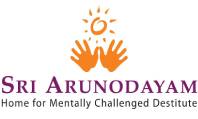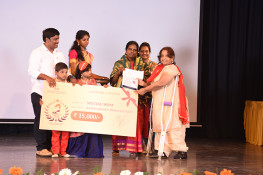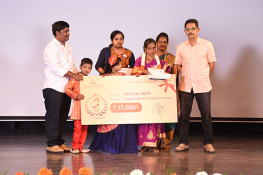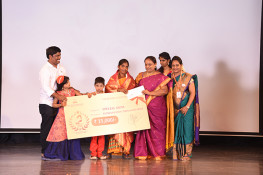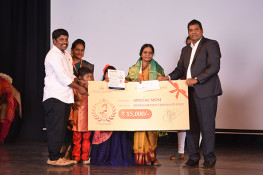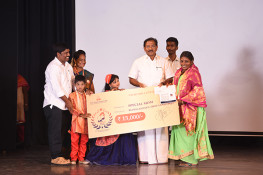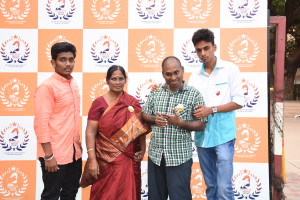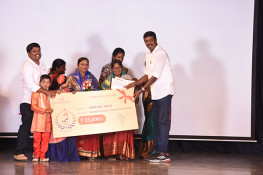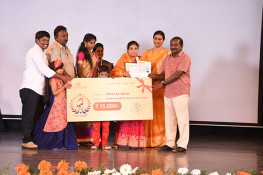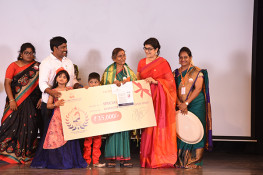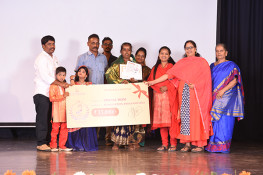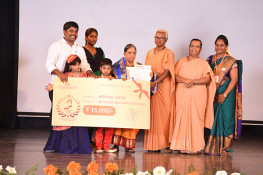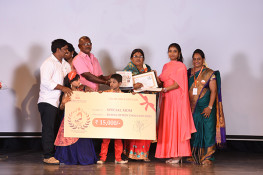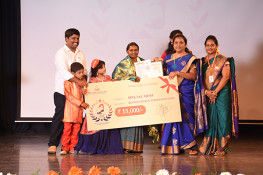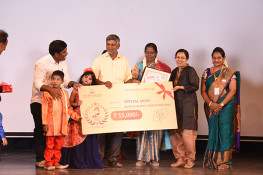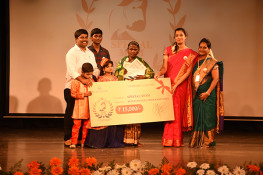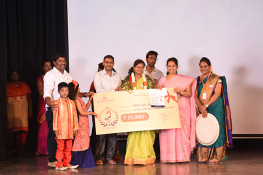SPECIAL MOM STORIES
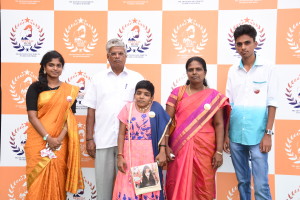
Anuradha K
Anuradha’s daughter, Leelavathi was born in 1998. She was a caesarean baby with no neck and a huge hump on the back of where her neck was supposed to be! The callous attitude of the Government hospital staff added to the worsening of Leelavathi’s condition in the early years. Over a span of a couple of weeks, the doctors found that the tumour-like lump was linked to her brain and a surgery was conducted when Leelavathi was just two months old. Within 2 weeks of the surgery, her head began to swell alarmingly and the doctors diagnosed it to be hydrocephalus – a condition where fluid accumulates in the head. Another surgery was performed and Leelavathi had stitches all over her head, neck and stomach, which was a gruelling ordeal for a little baby especially as the stitches kept breaking. The doctors then tried skin grafting, but that job too was a shoddy one! A family feud resulted in the couple being completely isolated at a time when they most needed help.
After a long and painful recovery, Leelavathi was diagnosed as a special child and her parents enrolled her in Spastics Society, Taramani where she received regular physiotherapy and speech therapy. She began to walk when she was 5 years old and the parents were advised to put her in a regular school. At the new school Leelavathi began speaking quite well but was inaudible due to her deformity. She studied up to the 8th standard there and was taken back to the Spastics Society to complete her 10th and 12th standards, which she did with the help of a scribe. She then went on to complete a computer course. Leelavathi also began working as a Special Educator Assistant (early intervention) at the Spastics Society, in the mornings. She is a keen observer, which helps her conduct various activities in the early intervention class and take good care of her young students. In the afternoons Leelavathi can be found at the vocational training centre where she very efficiently works the Xerox machines and makes artificial jewellery. She learnt weaving and is also good at operating the phones.
Leelavathi had a really bad start but she’s a shining star today – thanks to the unconditional love and utter commitment of her parents. “Our struggles and pain has paid off,” says Anuradha. “My husband stands by me and my daughter is now independent. What more can I ask for? I’m so happy and proud to say that I am her mother!”
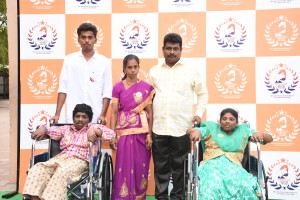
Jayara
Born in 1997, Jayara’s son, Imran did not show any of the signs of development expected of a child. He could not raise his head, crawl, walk or laugh even when he was two years old. Worried, she took him to the Egmore Children’s Hospital and to Stanley Medical College to get a diagnosis. She was advised to admit him in a school for spastics. The therapists and special educators at the school played a huge role in getting her son back on track, considering that he has cerebral palsy.
Jayara is a model parent in that she faithfully carries out the instructions of the special educators, even at home. She works diligently at his development. In 2000, she gave birth to a daughter, Jamira who also has cerebral palsy. Both her children are enrolled at the same school and they are happy to attend each day.
Jayara receives monthly aid from the Government (for special children) and aid from the special school. “My whole world revolves around my children, but I have no complaints,” she says. She has resigned herself to the fact that she may never hold a job or freely move around at will because she must be with the children at all times. Jayara was born in the very same house where they now live, so she is known to everyone in her community. Lucky for her, there are very supportive. Her landlord is compassionate and hasn’t made problems for them. Her neighbours are friendly and don’t show aversion towards the children as in other communities. In fact, the neighbours play with the children and even carry them to the hospital when they are sick.
Jayara advises parents to remain committed to their children’s development. “Take your children regularly for therapy and training. The teachers will do their best but you have to make the effort to get help,” she says. “Treat the teachers like your extended family. Frankly discuss your issues with them and try and find solutions. These children are God’s gift to us, so don’t desert them or show aversion. Love them like you would normal children. Be persistent and do your very best to improve their lives,” she says.
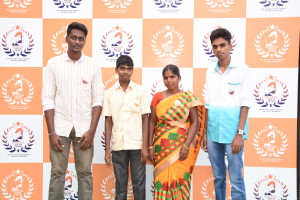
Kalaiselvi
Kalaiselvi married a distant relative. She has two children. Her daughter Parimala is normal but her son Vasanthkumar is not. He could not speak or walk even after three years and was declared intellectually challenged. At five, she admitted him to the Gorimedu Hospital where they said he had a hole in his heart. Suffering several other issues, the child needed constant care and Kalaiselvi gave up going to work to care for him. “He seldom sleeps at night and wanders out alone, hiding himself in the bushes for hours on end,” she says. Afraid of losing him, she ties him to her with a saree. Vasanthkumar tends to pick up fights with the neighbourhood children, making her have to move from house to house because the owners think he is a troublemaker.
Kalaiselvi’s daughter studied up to the 8th Standard but dropped out of school to take on work and earn for the family. Vasanthkumar appears to have no behaviour issues while at school but it’s a different story at other times. “The ruckus he causes gets us in a lot of trouble, but we understand that it is not wilful or spiteful behaviour. We try to be strict and not punish him because he is unaware of what he is doing,” she says.
Most people around appear to be scared of the boy and raising him has been a herculean task for this mother and daughter. But “I’m proud of being recognised for this difficult task,” she says. “I believe that it is our moral duty to give such children the help they need to develop to their fullest potential. If what they have isn’t curable, don’t complicate life for them. Just learn to accept the situation and try to make the most of it,” she says.
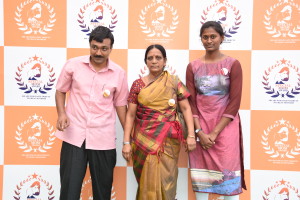
Kamala
Kamala’s husband just could not accept the fact that they had an autistic son. This drove the couple to divorce in 1987. Being the person she is, Kamala determined to do everything she could for the boy and thus began a wonderful journey in self discovery and fulfilment for both mother and son.
“When I left my husband, I told him that I would raise my son on my own even if it meant taking up menial labour. I was even willing to become a housemaid,” she says, “I just didn’t want to live with a man who couldn’t welcome his own son into his life.” Kamala’s journey since the divorce (almost 31 years ago) has been a long and difficult one. Left to fend for herself, she could have given up and lamented her fate, and no one would have blamed her. But that was not her style. This is an articulate, well-read and determined mother who got help for her son and even managed to complete a Diploma in Special Education Mental Retardation (DSEMR) at Balavihar. She then graduated as a Special Educator. Kamala ended up bagging a permanent position at Vijay Human Services.
Today, her son Gokul is 32 years old. “I’ve lived to fulfil my son’s wishes in every way,” she says. “Most parents of special children eventually tire of the daily routine. They start off with a lot of hope and then begin to get discouraged. The worst thing they can do is to discontinue their children’s therapy and training. It’s simply not right! They must persist if they want to see good results. If they can keep the child engaged, there’s absolutely no doubt that the child will learn in the long run,” she says confidently.
“I guess if I was awarded for a normal child I would not have received as much satisfaction. Yes, I’m tremendously happy to receive this award,” she says.
Kamala believes that all autistic children have extraordinary talent present within them. “It is our duty to identify such talent and train them to excel. These gifted children have a wonderful future if they are appropriately guided and trained. They have the potential to lead very successful lives,” she says.
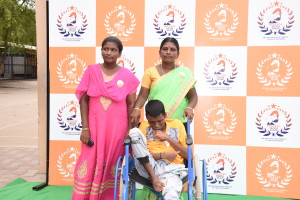
Kanniselvi
Kanniselvi is the mother of four children, two of whom are intellectually challenged – Esaki Muthu (22 years old) and Megala (18 years old). Her alcoholic husband is a daily wage labourer who often avoids work; whiling away his time at home. Sadly, he does not work to support his family nor is he of much use at home because he refuses to take care of the children or even touch them! Kanniselvi’s parents financed her first child’s treatment from birth. Apart from them, she credits the neighbours and special educators who have become like relatives to her, for her achievements. At one time, Kanniselvi herself developed fits but she never let her personal problem overshadow the larger dreams she had for her children.
Taking her son in his wheelchair one day for a haircut, the barber gave her Rs. 10/- and chased them away thinking they were beggars! “I literally fought to make him understand that we were there for a haircut!” she says with indignation. This appears to be the perception in her community where people comment on Esaki’s looks and appear to be fearful of him. “They fear that he might hit or bite them. But, he isn’t a violent child,” she says sorrowfully. “Of course, I feel sad when people look upon him with aversion. But, I ignore such behavior and move on.”
Kanniselvi says that she sees God Himself in her children, so she’s not really worried about their condition or situation. “Parents of special children experience a deep agony that normal parents do not,” she says. “We suffer deeply in the course of bringing up our children. Yet, we have experienced it all and risen above it!”
“Even though people avoid us, the recognition through this award is like God acknowledging us, which makes me very happy,” she says. “Don’t pay attention to those who discourage you, and don’t waste time brooding about your child. Focus on his or her development through education and training. Despite my situation, I’ve made it through all this! That’s why I’m not discouraged anymore,” she says.
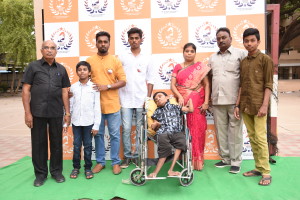
Lalitha Devi Chima Kurthi
Lalitha is the mother of three children. Her elder son, Bharathkumar was a premature baby. The family lived in Chennai for a while with Lalitha’s parents and Iyyappan (Sri Arunodayam’s Founder) used to visit their home regularly to provide rehabilitation and physiotherapy services to Bharathkumar. It is in the ground floor of Lalitha’s parents home that Sri Arunodayam commenced operations in 2002. Along with the other children, Iyyappan took personal care of Lalitha’s son.
“I had great expectations that my son would walk someday,” Lalitha says, “but that was not to be.” Lalitha and her family moved to Ongole, Andhra Pradesh and she took Bharathkumar back with her. “It’s taken me 13 long years to accept the fact that he will never walk again, but once I came to peace with the situation I decided that I would provide every facility for his rehabilitation within my own home,” she says. Yet, Lalitha is humble enough to say that she could not have achieved anything without the help and support of her family. “We had a lot of expectations for our son, but God didn’t grant us this fortune. Much later I came to accept that this child is truly God’s gift to me. Although he is completely immobile and cannot speak, he is a happy child and teaches me new things each day.”
Raising a special child is a huge challenge for parents – especially the mother. But “instead of brooding over the child’s inabilities, focus on his or her abilities and take steps to develop the child,” Lalitha says, “such efforts will pay off in the long run and provide some happiness for both the child and the family.”
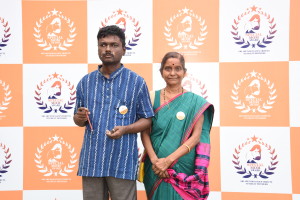
Meera Balachander
It was in her 7th month of pregnancy that Meera learnt that her son, Krishna, was to be a breech baby. The doctor did not think that this was an anomaly. However, when she had no pain 10 days after the predicted due date, she was given labour-inducing drips and Krishna was born without a birth cry after a long and tedious struggle. Surprisingly, his early milestones were normal. By 4 he could read, understand and cherish comics, music and games. His schooling (mainstream till the 6th standard), was difficult especially when it came to exams. Meera was told that he was a slow learner or learning disabled.
When the family shifted to Bangalore in 1990, Meera heard of Special Education for the first time and Krishna was admitted to a one-room Kannada medium school where he was happy for two years. Meera put him onto two music teachers and also worked with his love for puzzles, vocabulary and numbers. Krishna was immersed in music and became a diehard fan of Pandit Bhimsen Joshi. It was Dr. Rukmini Krishnaswami of DEC who first pronounced Krishna a ‘gifted’ child for his musical talent. Krishna asked Meera to put him in a vocational training school after he suddenly became aware that he was not disabled and that he did not fit in a special school.
However, the family took a violent blow when Krishna went into depression and psychosis at age 17. An EEG showed that he had narrowly escaped epilepsy! From 1996 to 2003, the family was in Mumbai where Krishna’s formal education and training came to an end. Though post psychosis he had lost his passion for Bhimsen Joshi, music still remained with Krishna. His second encounter with psychosis in 2002 left him quite dysfunctional – he could not eat, use the toilet or bathe by himself. He had also lost cohesive thinking and expression. From 2006, when the family moved to their own apartment in Chennai, Krishna gradually overcame many of the problems that his mental illness had given him and destiny led them to the Lotus Foundation, which transformed Krishna’s life. “If I had vehemently denied that Krishna had an intellectual disability when he was young, I feel strangely relieved today to see in him features of autism. It is the relief of having come to a place where he can be understood and nurtured without being thought of as strange,” Meera says.
Today, at 41, Krishna is at peace with himself and has 10 stage performances under his belt, thanks to Lakshmi, his teacher. He enjoys working on the sewing machine and mother and son make bags, pouches, curtains and pillows. From remaining confined to his bed for years, today he travels by MTC buses, unmindful of the jostling or the sweat. “He is like a phone without a memory card, living the present in the present,” Meera says. “He can fly into a momentary rage, but true to his oft-repeated mantra – ‘anyway, let us forget it’, he is back to normal in a jiffy. I wish I could do likewise! What trash we carry in the name of memory,” she says. Today, Krishna is recognized as a gifted singer and music therapist in the small world of autistic citizens. Whether seeing himself singing on TV or in magazines gives him happiness, can only be guessed.
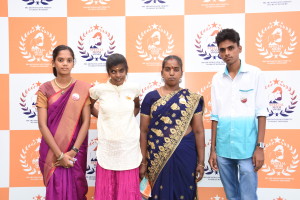
Murugeshwari
Murugeshwari has had a hard life from childhood. As her family wasn’t wealthy, she was married off to her Uncle. When Divya, her daughter was born, Murugeshwari had to face the fact that she was the mother of a special child. Murugeshwari worked hard to support her child who was unable to walk till she was 5 years old. That the child became mobile is due to the sheer tenacity of this incredible mother who says that she fashioned wooden splints out of logs and trained Divya to walk as they had no access to physiotherapy in their area!
When Divya was nine years old, Murugeshwari admitted her in Anbagam Special School which slowly began a transformation in the child. “My daughter grew in every aspect. Anbagam Special School gave me the confidence that she would get even better,” she says. The school authority asked her if she would be willing to assist with the cleaning, feeding and washing up activities, and although the salary was low, she agreed to take on the job just so that she could keep an eye on her daughter while helping with the other children. “My pregnancy makes me a mother to my child alone but my compassion makes me mother to all the children at Anbagam where I’m working as an ‘Assistant’ for the past 4 years,” she says. “All the children at the home treat me as if I were their own mother, calling me ‘Amma’”.
Murugeshwari strongly believes that God has blessed her through Divya. “If parents can move past their depression and grief to focus on developing and training their children from early on, they will become achievers. But nothing can be achieved without love and kindness,” she says.
“It’s easy for people to spout platitudes that God gives special children only to those who have patience. Yet, compared to me, there are parents who are worse off! I feel so sad to see them suffering,” she says. Murugeshwari believes that not enough is being done by the medical profession in terms of screening and diagnosis. Families are also not adequately counselled and children continue to be born with defects even though much of this is avoidable.
“Most people who marry closely within their families face this problem,” she says. “These conditions rarely occur for those who marry outside their families. Don’t marry within the family – whether it’s your aunt’s son or your uncle’s son, or whoever. It’s the children who always suffer in the end!” she says rather forcefully.
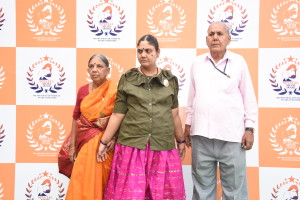
Premavathi Bai
Premavathi’s daughter Mekala was born normal she says, but when the child developed fever and was rushed to the hospital she wasn’t given the right treatment, due to which her brain was affected. For over three years, Premavathi carried Mekala from Pammal to West Mambalam Health Center for physiotherapy and took her to Egmore Children’s Hospital for speech therapy. When Mekala turned 13, she admitted her to Gnana Deepam where all the therapies were provided under one roof. In fact, Mekala was in the first batch of students when the school commenced. She was diagnosed as autistic with spasticity.
Unfortunately, Mekala hasn’t responded to the rehabilitation therapies and is completely dependent on her parents. She is unable to follow instructions and hasn’t made any noticeable progress. Premavathi coaxes Mekala to try and do things on her own, and is trying to teach her to work at various activities. Mekala has been at the school for 23 years and Premavathi also worked there as a weaving assistant.
Around two years ago, Premavathi’s relatives assured her that they would help support the family and convinced them to move to Kumbakkonam. Once there, the relatives renegaded on their word and Premavati’s family had to fend for themselves. Premavathi’s husband is 77 years old and not well qualified; he isn’t financially stable either. He cannot get a job due to his age. The couple find it difficult to make ends meet. Mekala is a bit overweight and the aged parents find it difficult to manage her. Mekala still needs help in using the toilet and in grooming herself. Premavathi has developed back troubles and she herself needs physiotherapy.
“I have to be brave and take good care of her. I must be careful not to express myself in anger. Although she does understand the things I say, I need to say them in a good way,” Premavathi says. “Ultimately, we will have to leave our daughter in the care of an organization willing to look after her. We will do our best to leave whatever we have within our means for the caretaker. We really don’t have other options. We have to accept this situation as God’s will for us. There’s nothing more to it,” she says with resignation.
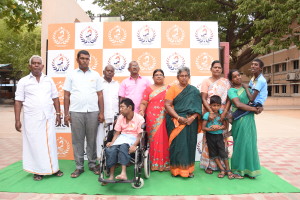
Senthamil Selvi
Senthamil Selvi and her family live in Ennore. She is the mother of two special children – Dinesh (28 years old) and Balu (25 years old). Dinesh has ADHD and Balu has cerebral palsy. The parents took Balu to the Spastic School in Tondiarpet in 1993 where they too were encouraged to receive training. It was there that they realised that Dinesh was also a special child. They took Dinesh to Professor Jayachandran in 1994 for treatment and he referred them to Maduram Narayanan Centre. Senthamil Selvi used to travel daily from Ennore to T Nagar for her son’s treatment.
At the center she was advised to take up work as an Assistant Teacher. Later, she joined Avvai Kappagam as an Assistant Teacher in Royapuram. Once there, Dr. Shalini encouraged her to do the Special Educator’s course. And she did, traveling by bus, taking her two boys along with her everywhere. The buses were crowded and she found it difficult to manage them. A thought entered her mind to set up a special school in her own neighbourhood, as they had none at that time.
On the 1st of January 2002, Senthamil Selvi’s dream became a reality. She opened her own school – Kumaran Special School – in Ennore with 5 children. The school has run successfully over the past 15 years. She has trained over 400 students and currently has 40. 10 students were mainstreamed, proving her successful work with them.
“I was a very adamant and wilful person. Even my husband used to give in to me,” she says. “And then, my eldest son was born. He’s the only one I fear as he holds me accountable. I need to be careful to honor my word because he doesn’t accept excuses.” She says that her sons are like children constantly craving love and attention and that she works hard to give them the best opportunities in life. “I’ve raised my children to be fairly independent,” she says; “I hope that parents watching this film will learn to overcome their many challenges in a positive way and not make hasty or drastic decisions in despair.”
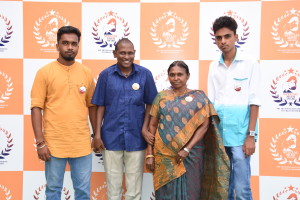
Sharadha Devi
Sharadha married at 21 and had a daughter, Ramya Devi in her 6th year of her marriage. Two years later, in 1986, her son Ganeshkumar was born, but her joy was short-lived as he was a special child. The doctors too didn’t reveal much about his condition and stated that things would get better as the child grew. In the meanwhile, her husband developed an aversion for the child, refusing to care for him or provide any financial support. Sharadha placed Ganeshkumar in a nearby ‘Balvadi’ when he was 5 years old and by 7 he was able to walk. Ganeshkumar had a problem with shivering arms and feet and a homeopathy doctor set him right by the time he was 12. She somehow managed to provide for her son’s medical expenses.
Her husband often picked quarrels with her on account of the boy and despite his staunch objection, Sharadha admitted Ganeshkumar in Maria Montessori Special School in Madurai. She later moved him to Betsan school where the Administrator, Mr. Ravikumar, advised her to undergo a Bridge Course from a Trust located in K.K. Nagar. Despite her husband’s objections again, she successfully completed the course and received the RCI certificate. The constant discord between the couple resulted in their separation.
She then approached the Maria Montessory school and Dr. Nammazhvar advised her to take a caregiver’s course conducted by the school with the assurance that he would give her a job there. Once employed, she left her husband’s home and moved into a small rented house with her son. Judging her for walking out on her husband, all her relatives shunned her. But Sharadha continued with her work and studies. In the evenings she would work in an eye clinic where she was encouraged to take the M.A Public Administration (2 year course) through Open University. She worked for 8 years in Sri Krishna Development School run by the TVS Group. She was finally financially stable! Having tutored her son efficiently down the years, Ganeshkumar was able to speak to relate better.
“As parents we must accept our children and make all the effort to help them develop. Listening to those who are not experts in this area, will only hurt them,” she says. “Taking them to the priest and the temple won’t help. The most important thing to do is to ensure that they receive proper training. Their lives can change depending on the quality of education and training we give them. Only to the extent we educate them – to that extent they will be successful,” she says.
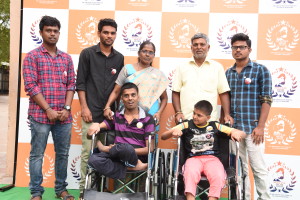
Usharani
From the time her son Shanmugapriyano was born, Usharani noticed the delay in his development at each stage. He was finally diagnosed as an MR child. Three years later, she had a daughter – Padma Priya, and as fate would have it, she too was an MR child! The parents grieved but on advice from the doctor started both children on physiotherapy and speech therapy. They admitted them to Gnana Deepam special school where the children received good training and the parents were regularly counselled too.
“Once we accepted our fate and believed that these children are God’s gift to us, we never turned back and took every opportunity to develop them as best we could.” Usharani says. Despite all this, they still battle thoughts of dread about the fate of their children on their demise. “I never shed a tear about my difficulties, but I cry when I see that my children may never be able to enjoy a normal life like other children,” she says.
“I sometimes feel frustrated that I am frail and lack the strength to bear all things for them,” she says. Usharani and her husband believe that serving and caring for their children is the only world for them, and they hope to live long – not for their sakes, but for the sake of their children. “The heart beats to keep a human being alive, but our hearts beat for our children,” they say.
Usharani and her husband work as a team in caring for and rehabilitating their children. They look for ways to tap into their children’s inherent talents and then patiently draw them out. It’s a continuous process in the course of which Usharani can finally say, “I am proud to be the mother of special children. Even parents raising normal children don’t get this recognition. We are deeply honored.”
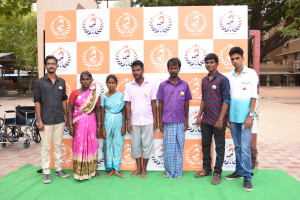
Vedavalli
Vedavalli is the mother of three intellectually challenged children – Suresh (31 years old), Kasthuri (30 years old) and Prakash (29 years old). She lost her husband, Vasu when the children were very young. Since then, she has singlehandedly raised the children with no support from anyone. Vedavalli works at various jobs in the fields, on construction sites and even sells ‘appalams’ to earn for her family. “We starve on the days I don’t get work,” she says.
“Now that they’ve grown, the difficulties have increased manifold.” Vedavalli pleads with Sri Arunodayam to accommodate at least one of her boys. “There are times I’m so depressed that I feel driven to end it all – for my children and myself… but I cannot do it because I love them. I will take care of them as best as I can, but these thoughts do creep in sometimes,” she says.
Vedavalli is 60 years old and exhausted. “I don’t have the strength to work anymore. I’ve developed Achilles heel which restricts my movement. It’s become physically exhausting to care for three children who cannot fend for themselves.”
“Wherever I go I am pitied and people discourage me further saying that my efforts don’t make a difference as my children continue to remain dependent. What is to become of them when I’m gone?” she laments. As she gets older her fears loom larger. “I’ve lost my peace with age catching up, and I spend many sleepless nights grieving about the future of my children,” she says.
“My children are not even capable of begging to be able to make a living. They will not be able to sustain themselves once I’m gone.”
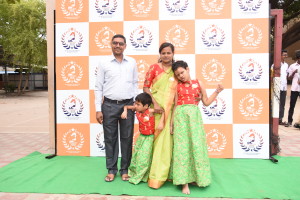
Vishali Kemisetti
Vishali is the mother of two special children – Mallika (14 years old), and Madhulika (8 years old). The family resides in Warangal, Telangana. Vishali and her husband try to give their children everything they need to lead healthier and happier lives. They believe in developing them to become as independent as they can be. “We are constantly thinking of how to improve their condition,” she says. At the same time, the couple express their constant struggle with depressive thoughts about their children’s future. This is something that no parent with a special child can escape.
As Mallika is very unsteady on her feet she is quite accident prone, so Vishali is constantly with her girls. “My children have made me a strong woman today,” she says. “People judge my suffering saying that I have such children because of my sins or because of their sins. But I don’t believe so.” It appears that Vishali and her husband have faced a good bit of judgement and criticism that has only served to mould them into mature and loving parents.
“I still can’t wrap my head around this being God’s gift either. Be whatever it may, these are still my children. I advise parents to distance themselves from people who are judgemental and negative,” she says. “Just do what you know is right as a parent and don’t believe in superstitions, such as wearing talismans and charms. This is unnecessary.” Vishali is a firm believer in keeping a positive attitude and working towards one’s goals. “If we remain positive and continuously impart training to these children, they will definitely achieve something in life,” she says.
“I had applied for this award because of the promise of free service for such children after their parents’ demise. I had not applied to show that I had achieved anything big and I wasn’t even sure if I would be selected as I live in Warangal, and the awarding organisation is based in Chennai. But I am happy to be selected – not for the award, but for the fact that this organisation will take care of my children after I’m gone,” she says.
“Society views intellectually challenged children as unpredictable and violent,” she says. “It’s sad that they don’t want to change such thinking. Whatever label is used to describe these children, society still thinks of them as ‘mental’.” Vishali ends with a powerful message: “People don’t need to come forward to help. The greater help lies in not criticising and judging us.”
